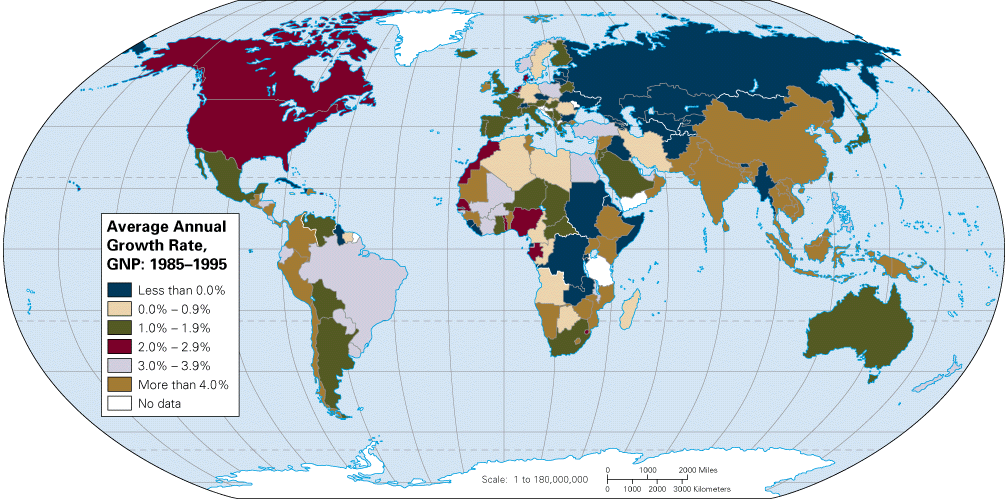
Innovation Is the Engine of Growth
There is general agreement now that innovation is the engine of long-run economic growth.28 Those who make this argument define innovation broadly to include not just new products, but also new processes, new organizations, new management practices, and new strategies. Thus, Toys "R" Us's strategy of establishing large warehouse-style toy stores and then engaging in heavy advertising and price discounting to sell the merchandise can be classified as an innovation because Toys "R" Us was the first company to pursue this strategy. One can conclude that if a country's economy is to sustain long-run economic growth, the business environment within that country must be conducive to the production of innovations.
Innovation Requires a Market Economy
This leads logically to a further question--What is required for the business environment of a country to be conducive to innovation? Those who have considered this issue highlight the advantages of a market economy.29 It has been argued that the economic freedom associated with a market economy creates greater incentives for innovation

Growth in Gross National Product, 1990 - 97

The Human Development Index, 1995
Source: Quality of Life: The Human Development Index. Source: Map 28, John Allen, Student Atlas of World Geography, Dushkin/McGraw-Hill, p. 46. Data are from "Human Development Report 1998" by the United Nations Development Programme. Copyright 1998 by the United Nations Development Programme. Used by permission 1999 of Oxford University Press, Inc.
than either a planned or a mixed economy. In a market economy, any individual who has an innovative idea is free to try to make money out of that idea by starting a business (by engaging in entrepreneurial activity). Similarly, existing businesses are free to improve their operations through innovation. To the extent that they are successful, both individual entrepreneurs and established businesses can reap rewards in the form of high profits. Thus, in market economies there are enormous incentives to develop innovations.
In contrast, in a planned economy the state owns all means of production. Consequently there is no opportunity for entrepreneurial individuals to develop valuable new innovations, since it is the state, rather than the individual, that captures all the gains. The lack of economic freedom and incentives for innovation was probably a main factor in the economic stagnation of so many former communist states and led ultimately to their collapse at the end of the 1980s. A similar stagnation phenomenon occurred in many mixed economies in those sectors where the state had a monopoly (such as health care and telecommunications in Britain). This stagnation provided the impetus for the widespread privatization of state-owned enterprises that we witnessed in many mixed economies during the mid-1980s and is still going on today (privatization refers to the process of selling state-owned enterprises to private investors).
A recent study of 102 countries over a 20-year period provided compelling evidence of a strong relationship between economic freedom (as provided by a market economy) and economic growth.30 The study found that the more economic freedom a country had between 1975 and 1995, the more economic growth it achieved and the richer its citizens became. The six countries that had persistently high ratings of economic freedom during the 1975 - 1995 period (Hong Kong, Switzerland, Singapore, the United States, Canada, and Germany) were also all in the top 10 in terms of economic growth rates. In contrast, no country with a persistently low rating achieved a respectable growth rate. For the 16 countries for which the index of economic freedom declined the most during the 1975 - 95 period, average annual gross domestic product fell at an annual rate of 0.6 percent.
